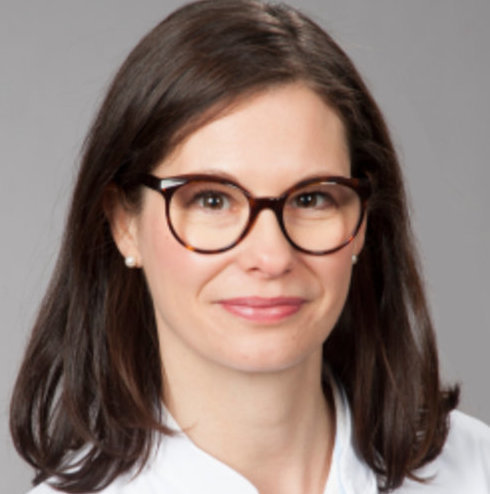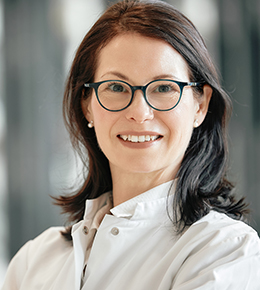

The group focuses on the health-related quality of life, psychosocial burden and unmet needs in neuro-oncological patients. Our key question is „how do the patients perceive their disease and our therapy?” We could recently show that neuro-oncological patients are highly burdened independent of their tumor entity. Their unmet needs do change during the disease trajectory and patients need a specific assessment due to their unique symptom profile. Therefore, we currently evaluate alternative assessment methods, e. g. the direct assessment of unmet needs during the patient-doctor consultation in high-grade glioma patients, as well as the development of an app-based assessment of health-related quality of life. Furthermore, we work on the development of new health care models, e.g. prehabilitation in glioblastoma patients.
Selected publications
Please find the complete list of publication on PubMed
Neuro-oncological patients' and caregivers' psychosocial burden during the COVID-19 pandemic-A prospective study with qualitative content analysis. Binswanger J, Kohl C, Behling F, Noell S, Hirsch S, Hickmann AK, Tatagiba MS, Tabatabai G, Hippler M, Renovanz M. Psychooncology. 2021 Sep;30(9):1502-1513.
Development of screening questions for doctor-patient consultation assessing the quality of life and psychosocial burden of glioma patients: an explorative study. Voß H, Scholz-Kreisel P, Richter C, Ringel F, Singer S, Renovanz M. Qual Life Res. 2021 May;30(5):1513-1522.
Towards the targeted assessment of relevant problems: Optimization of the distress Thermometer for adult neuro-oncological patients. Goebel S, Knuth C, Damm M, Linden D, Coburger J, Ringel F, Tabatabai G, Mehdorn M, Renovanz M. Psychooncology. 2020 Dec;29(12):2057-2066.
Glioma patients in outpatient care-optimization of psychosocial care in neuro-oncological patients (GLIOPT): Protocol for a cluster randomized controlled trial. Renovanz M, Hippler M, Voss M, Wehinger J, Keßler AF, Gempt J, Nadji-Ohl M, Weiß Lucas C, Rapp M, Misch M, Coburger J, Mehlitz M, Meixensberger J, Keric N, Tabatabai G, Blettner M, Schranz M, Singer S. Trials. 2020 May 27;21(1):434.
Supportive Care Needs in Glioma Patients and Their Caregivers in Clinical Practice: Results of a Multicenter Cross-Sectional Study. Renovanz M, Maurer D, Lahr H, Weimann E, Deininger M, Wirtz CR, Ringel F, Singer S, Coburger J. Front Neurol. 2018 Sep 11;9:763.
Information needs of patients in spine surgery: development of a question prompt list to guide informed consent consultations. Renovanz M, Haaf J, Nesbigall R, Gutenberg A, Laubach W, Ringel F, Fischbeck S. Spine J. 2019 Mar;19(3):523-531.
Compliance with patient-reported outcome assessment in glioma patients: predictors for drop out. Renovanz M, Hechtner M, Kohlmann K, Janko M, Nadji-Ohl M, Singer S, Ringel F, Coburger J, Hickmann AK. Neurooncol Pract. 2018 May;5(2):129-138.
Factors associated with supportive care needs in glioma patients in the neuro-oncological outpatient setting. Renovanz M, Hechtner M, Janko M, Kohlmann K, Coburger J, Nadji-Ohl M, König J, Ringel F, Singer S, Hickmann AK. J Neurooncol. 2017 Jul;133(3):653-662.
Assessing psychological and supportive care needs in glioma patients - feasibility study on the use of the Supportive Care Needs Survey Short Form (SCNS-SF34-G) and the Supportive Care Needs Survey Screening Tool (SCNS-ST9) in clinical practice. Renovanz M, Hickmann AK, Coburger J, Kohlmann K, Janko M, Reuter AK, Keric N, Nadji-Ohl M, König J, Singer S, Giese A, Hechtner M. Eur J Cancer Care (Engl). 2018 Jan;27(1).
Glioma patients in outpatient care-optimization of psychosocial care in neuro-oncological patients (GLIOPT)
We assessed in preliminary work the unmet needs of patients with brain tumors especially with high-grade gliomas. Subsequently we enrolled a prospective study to investigate whether a systematic implementation of signaling questions into the routine outpatient consultation will be helpful to provide adequate support for patients with high-grade gliomas.
It is a multicenter cluster randomized study with two arms. The intervention includes an assessment of psychosocial distress of patients in doctor-patient conversation compared to assessment of psychosocial distress via questionnaire (control, standard of care). In total, 600 HGG patients were enrolled so far (intended: 770). The primary outcome is the number of HGG patients with increased psychosocial distress who receive professional support from psychosocial services. Secondary endpoints are inter alia number of patients reporting psychosocial distress and unmet needs detected correctly by the respective method.
Our hypothesis is that an assessment conducted directly by attending doctors and in which the doctors talk to patients with HGG will be more effective than an assessment via a questionnaire, leading to better identifying patients in need of support. This may lead to an improvement of health care in these patients. Further, this method might be implemented also in other brain tumor patients (e.g., patients with brain metastases). Trial registration: German Clinical Trials Register, DRKS00018079.
Cancer patients under targeted therapy: App-based assessment of patient-reported outcomes (TRACE)
Cancer patients under targeted therapy are a heterogeneous patient group, mostly in later disease trajectory. After extended molecular diagnostics and discussion in the Molecular Tumor Board, they start with the recommended therapy. For patients in precision oncology trials, the main outcome is the PFS ratio, defined as the PFS interval associated with the molecularly instructed therapy of the individual patient (PFS 2) divided by the PFS interval associated with the last prior systemic therapy (PFS1). However, patient-reported outcomes are not considered so far.
We therefore developed an app for the assessment of health-related quality of life, psychosocial and symptom burden of the patients under molecular based therapy. It includes inter alia the following instruments: European Organization for Research and Treatment of Cancer (EORTC) quality of life questionnaires (disease specific), Distress Thermometer, Work Productivity and Activity Impairment Questionnaire: General Health (WPAI:GH). The first part of the study is a pilot test including usability and feasibility assessment, which is ongoing. So far, we included 8 patients.
The aim is to evaluate the app in 2022, to optimize it accordingly and to enroll a multicenter application study thereafter.










